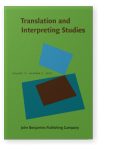Vol. 17:2 (2022) ► pp.287–312
The reading habits of professional signed and spoken language interpreters
Reading is a critical process for conscious learning and enhancing knowledge; however, little is known about reading in interpreters’ professional lives. We used an online survey to collect information about the reading habits of signed language interpreters (n = 1,382) and spoken language interpreters (n = 601) to examine overall patterns, as well as variations, between the groups. The interpreters responded to questions regarding (a) engagement with reading types, (b) hours spent reading, (c) motivations for reading, (d) factors that reduce engagement in reading, (e) reading in which interpreters should engage, (f) relevance of reading to professional practice, and (g) priority of research topics for reading. Similarities were found between the groups, with divergence in three areas – reading preparation materials, reading research studies, and the types of research studies the participants wish to read. The results provide insights into professional interpreters’ engagement with reading and its application to their professional practice.
Article outline
- Introduction
- Methods
- Participants
- Gender
- Professional experience
- Education
- Work status
- Survey instrument
- Procedures
- Analysis
- Results and discussion
- Interpreters’ engagement with reading types
- Interpreters’ hours spent reading
- Interpreters’ motivations for reading
- Factors that reduce interpreters’ engagement in reading
- Types of reading in which interpreters should engage
- Relevance of reading types to interpreting practice
- Research topics of high priority to interpreters
- Conclusion
- Acknowledgements
- Notes
-
References
